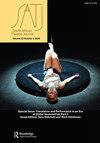Constructing Patience: postcolonial theatre as a possibility for redemption
IF 0.2
0 THEATER
引用次数: 0
Abstract
This paper centres on the definition of failure in a theatrical work. Failure is pursued as an epitome for possibilities, thus shifting the boundaries of theatrical work outside of conventional lines of understanding. The notion is to remove the fear of failure within a work, in order to explore new means through which a work can be produced. In this article, myself, the researcher, and my supervisor discuss the failures within my theatrical work, in order to re-imagine new possibilities in which the work can occur. Failure is seen as an opportunity, to not only draw on what it is that failed within a work, but to also build on that which has worked. The work itself centres on failure. It is thus a case where form and content mirror the possibilities through which an artwork can be reproduced. The article refers to notions of queerness when referring to failure. This queerness is also situated within the theories of Walter Benjamin. Failure becomes a historical construct, and becomes the key means through which to constantly reproduce the postcolonial effect. Here, the postcolonial refers to the failure of Colonialism, as well as the failure in progressing the self forward after breaking the actions put forth by Colonialism. The objective of this article is to move postcolonial texts forwards, to learn from the failures committed, and to reproduce postcolonialism as a transformative entity.建构耐心:作为救赎可能性的后殖民戏剧
本文主要研究戏剧作品中失败的定义。失败被视为可能性的缩影,从而将戏剧作品的界限转移到传统的理解之外。这个概念是为了消除作品中对失败的恐惧,从而探索制作作品的新方法。在这篇文章中,我本人、研究人员和我的导师讨论了我戏剧作品中的失败,以重新想象作品可能发生的新可能性。失败被视为一个机会,不仅可以利用作品中失败的东西,还可以在成功的基础上再接再厉。这项工作本身以失败为中心。因此,在这种情况下,形式和内容反映了可以复制艺术品的可能性。这篇文章在提到失败时提到了古怪的概念。这种怪异也存在于沃尔特·本雅明的理论中。失败成为一种历史建构,成为不断再现后殖民效应的关键手段。在这里,后殖民主义指的是殖民主义的失败,以及在打破殖民主义所提出的行动后未能推进自我。本文的目的是推动后殖民文本向前发展,从失败中吸取教训,并将后殖民主义再现为一个变革性的实体。
本文章由计算机程序翻译,如有差异,请以英文原文为准。
求助全文
约1分钟内获得全文
求助全文

 求助内容:
求助内容: 应助结果提醒方式:
应助结果提醒方式:


